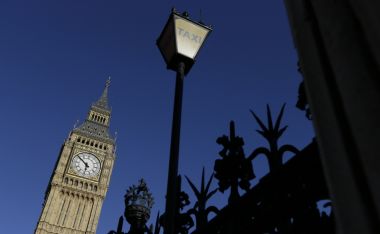Jeremy Moodey: Now is the time to recognise Palestine

As I wrote for Christian Today back in May, Pope Francis' historic visit to the Holy Land earlier this year caused quite a stir. For a start, he travelled to the West Bank through Jordan, which angered the Israeli government, who want VIP visitors to grant implicit recognition to Israel's 47-year imperium in the West Bank by starting their visits in Tel Aviv. All previous Papal visits had fallen into this trap. But the most eye-catching moment was when the Pope stopped for an impromptu photo-op and moment of prayer by the Israeli separation barrier in Bethlehem. The broken English graffiti on the 25-foot wall read: "Pope, we need to speak about justice" and "Bethlehem look like Warsaw Ghetto". The parallels with the Holocaust were ill-judged, but no wonder some Israeli groups criticised the Vatican for allowing the Pontiff to be "manipulated" by his Palestinian hosts. In fact, the Pope knew exactly what he was doing.
Perhaps the most controversial part of Pope Francis's trip was also the least noticed. The Vatican was clear months before the visit that the Holy Father was not just visiting the 'occupied Palestinian territories' as the West Bank, Gaza and East Jerusalem are rather inelegantly described by the international community. He was visiting the State of Palestine. This conferred on Palestine a formal diplomatic status which, though comprehensively endorsed by 138 votes to 9 in the UN General Assembly in November 2012, is still not recognised by Israel, the United States, the UK or many other Western countries. And the Vatican's terminology was not a diplomatic slip of the tongue; the Pope himself referred to the "State of Palestine" in his speech in Bethlehem.

So why has the UK not followed the Pope's lead? The UK refuses to recognise Palestine (although we do give the Palestinian diplomatic 'mission' in London certain privileges) because – the government claims – to do so might pre-judge the outcome of any negotiated peace settlement between Israel and the Palestinians. The British position was set out by the then Foreign Secretary William Hague in a speech to Parliament in November 2011: "We reserve the right to recognise a Palestinian state at a moment of our choosing and when it can best help bring about peace."
There are two major problems with this UK stance. The first is that waiting for a peace settlement in Israel/Palestine is like waiting for Godot, especially given Israel's increasingly hardline and rejectionist policies (implicitly supported by the United States). The ill-fated Oslo Accords of 1993-95 were supposed to mark a major step towards a negotiated peace, especially as the Palestinian leadership itself committed in the Accords to de facto recognition of Israel and its right "to exist in peace and security" (there was no equivalent Israeli recognition of Palestinian rights). But the subsequent two decades have yielded scant reward for this concession by the Palestinians; on the contrary, they have witnessed continued military occupation, the massive expansion of Israeli settlements in East Jerusalem and the West Bank, and the humanitarian disaster that is Israel's blockade of and regular assaults on Gaza. As the negotiated settlement which would trigger UK recognition becomes an ever-remote possibility, many people are asking: so should we not take the bold step of recognising Palestine now?
The second problem is that the UK's wait-and-see policy leaves the two parties to the dispute impossibly unbalanced. Britain formally recognised the State of Israel on 28 April 1950, less than two years after its establishment. This happened despite the fact that Israel at that point had forcibly occupied much more of Mandate Palestine than had been awarded to the 'Jewish State' under the 1947 UN Partition Plan (in 1950 it controlled around 77 per cent of the land, compared to the 56 per cent envisaged under the Plan) and despite the fact that even in 1950 (as now) Israel had not defined its precise borders. As a former British Consul General in Jerusalem who supports UK recognition wrote recently: "One people has a state; the other merits one. I submit that now is the time for our Government to recognise the State of Palestine, just as we recognised Israel in 1950."
Israel is of course vociferously opposed to recognition of the State of Palestine; a decision earlier this month by Sweden to recognise Palestine (the first major West European nation to do so) was strongly criticised by the Israeli government. But Israel's motivation is clear. It is desperate to preserve the current asymmetry of power between itself and the Palestinians; there is no security interest of Israel which is damaged by recognition of the State of Palestine. All parties continue to recognise Israel's right to defend itself and its citizens within secure borders, even if those borders have never been defined.
Which is why a backbench motion to be discussed in the British House of Commons this coming Monday (13 October) has attracted considerable attention. Sponsored by a cross-party group of MPs (including the veteran Jewish MP Gerald Kaufman), the motion calls on the British Government to "recognise the state of Palestine alongside the state of Israel". The motion is non-binding on the government, and – being un-whipped and occurring on the first day of business after the Conference recess – may well not attract many MPs into the chamber. But it is precisely for these reasons that the motion could just possibly be passed. In which case it would be a brave Foreign Office minister who persisted with the current UK policy against the express will of Parliament. No wonder organisations committed to a just peace in Israel and Palestine such as the Palestine Solidarity Campaign and the Quakers have been furiously asking their supporters to lobby their MPs to support the motion.
I too hope the motion will be passed, and have written to my MP asking her to support it. A decision by the UK to recognise Palestine may be largely symbolic, but it will be powerfully so, especially in the context of our nation's shabby history when it comes to the Israel/Palestinian conflict, not least the imperialist hubris of the 1917 Balfour Declaration and our gross neglect of Palestinian Arab rights during the British Mandate of 1920-48. It may well prompt other Western nations to follow suit, and will leave the United States (which continues to use its Security Council veto in support of Israel and against Palestinian interests) in an increasingly isolated position. Israel must be under no doubt that it cannot indefinitely deny the Palestinian people their basic rights. Wait-and-see has not worked; we have waited for over 20 years, and seen only failure and obstructionism in the so-called peace talks, together with almost half a million more illegal Israeli settlers in East Jerusalem and the West Bank. The time for UK recognition is now. The Palestinians have already waited for far too long.
Jeremy Moodey is Chief Executive of Embrace the Middle East, the Christian development charity. More details at embraceme.org.











